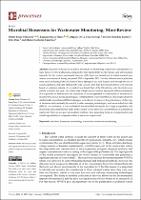| dc.description.abstract | Research on the use of microbial biosensors for monitoring wastewater contaminants is a topic that covers few publications compared to their applicability in other fields, such as biomedical research. For this reason, a systematic analysis of the topic was carried out, for which research-type articles were reviewed during the period 2012 to September 2022. For this, different search platforms were used, including PubMed, ScienceDirect, Springer Link, and Scopus, and through the use of search equations a relevant bibliography was located. After that, the research articles were selected based on exclusion criteria. As a result, it was found that, of the 126 articles, only 16 articles were strictly related to the topic, since there was a duplication of articles among the different databases. It was possible to demonstrate the usefulness of microorganisms as components of biosensors to monitor BOD, heavy metals, and inorganic contaminants in wastewater that also had a high sensitivity. Additionally, recombinant DNA techniques were shown to improve the performance of this type of biosensor and can finally be coupled to other emerging technologies, such as microbial fuel cells (MFCs). In conclusion, it was established that microbial biosensors have high acceptability and monitoring characteristics that make them a useful tool to detect low concentrations of pollutants in wastewater that can also provide results in real-time, thus generating forms of ecological safety and social responsibility in companies where wastewater is generated. | es_PE |


